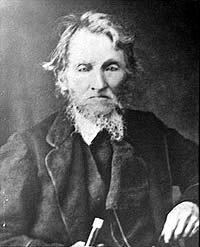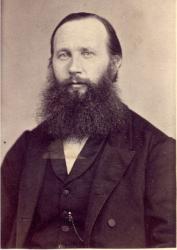1713 - 1780 Author of "Aus Gnaden wird der Mensch gerecht" in Die Glaubensharfe (With Melodies) Liebich, Ehrenfried, was born July 15, 1713, at Probsthain, near Goldberg, Silesia, where his father was a miller. He assisted his father in the mill up to his sixteenth year, and was thereafter allowed to study at the Latin school at Schweidnitz, and the St. Elisabeth school at Breslau. At Easter, 1738, he entered the University of Leipzig as a student of Theology, and on concluding his course in 1740, was for some time engaged in private tuition. In April, 1742, he became pastor at Lomnitz and Erdmannsdorf, near Hirschberg, Silesia, and remained there till his death on June 23, 1780 (Koch, vi. 391; Allgemeine Deutsche Biographie, xviii. 584, &c).
Liebich is one of the best German hymn-writers of the middle of the 18th century; Scriptural, heartfelt, and good in style, always edifying, if sometimes too didactic. He had begun hymn-writing about 1749, and contributed 8 hymns to the Hirschberg Gesang-Buch, 1752. A copy of this book fell into the hands of C. F. Gellert during a visit to Carlsbad in 1763, and through his encouragement Liebich began again to compose hymns. He published his compositions as: (1) Geistliche Lieder und Oden, &c, Hirschberg and Leipzig, 1768, with 142 hymns. (2) New ed., Liegnitz, 1773; with a second part, entitled, Geistliche Lieder zur Erbauung, Liegnitz, 1774, with 94 hymns.
A considerable number of his hymns passed into German common use, and still hold their place. Those which have been translated into English are:—
i. Dir, dir, du Geber aller Gaben. Harvest Thanksgiving. 1768, p. 128, in 16 st. of 6 1., entitled, "The Goodness of God in the Harvest." This has passed into English through the following forms.
1. O dass doch bei der reichen Ernte. This is st. xi.-xvi., as altered by J. S. Diterich, in the Berlin Gesang-Buch, 1780, No. 172 ; repeated in the Berlin Geistliche Lieder, ed. 1863. From this form the recasts of st. xii.-xvi., beginning, “Kommt, Christen, Gottes Huld zu feiern," were included, as No. 250, in Bunsen's Versuch, 1833, and translated as:
Come, Christians, praise your Maker's goodness. A good translation from Bunsen, by Miss Winkworth, as No. 181, in her Chorale Book for England; repeated in the Ohio Evangelical Lutheran Hymnal,1880.
2. Wir kommen deine Huld zu feiern. This is a very greatly altered form of st. xii. ff., as No. 850, in the Berlin Gesang-Buch, 1829; retaining little either from Liebich or Diterich. It is repeated in Bunsen's Versuch, 1833, No. 666, and the Württemberg Gesang-Buch, 1842, No. 543. The translation in common use from this form is:—
We come, our hearts with gladness glowing. A good translation from the text of 1829, by Miss Cox, in her Sacred Hymns from the German, 1841, p. 199; repeated, abridged, in the American Unitarian Hymns for the Church of Christ, Boston, 1853, and in Archdeacon Pott's Collection, 1861.
Another translation is: "O Lord, Thy goodness we adore," by Lady E. Fortescue, 1843, p. 29.
ii. Gott ist getreu! Sein Herz, sein Vaterherz. Trust in God. 1768, p. 181, in 9 st. of 9 lines, entitled, "The faithful God, 1 Cor. x. 13." It is a beautiful hymn, and has been specially appreciated in Württemberg, where it is found in the Württemberg Gesang-Buch, 1791, No. 24 (1842, No. 45). Lauxmann, in Koch, viii. 416, says it was the favourite hymn of J. C. F. Steudel, Professor of Theology at Tübingen, who died 1837; was sung by the Württemberg contingent at a field service near Toul, in August, 18-70, during the Franco-German War, &c. The translations are:—
1. Our God is true! Them He will ne'er forsake. In full, by Dr. H. Mills, in his Horae Germanica, 1845 (1856, p. 182); repeated, abridged, in the American Lutheran General Synod's Collection, 1852, and the Ohio Evangelical Lutheran Hymnal, 1880.
2. My God is true! His heart, a Father's heart. A good and full translation by R. Massie, in his Lyra Domestica, 2nd Ser., 1864, p. 119; repeated, in full, in Reid's Praise Book, 1872; and abridged in the Ibrox Hymnal, 1871.
iii. Hier ist mein Herz! Mein Gott, ich geb' es dir. Self-surrender to God. 1768, p. 79, in 9 st. of 9 1. (11. 1, 9 of each st. being "Hier ist mein Herz"), entitled, “Surrender of the heart to God," and suggested by Proverbs xxiii. 26. Included, as No. 763, in the Berlin Geistliche Lieder, ed. 1863. Translated as :—
Here is my heart! my God I give it Thee. A good translation, omitting st. iv., by Mrs. Findlater, in Hymns from the Land of Luther, 1st Ser., 1854, p. 16 (1884, p. 21). Included, in full, in Boardman's Selections, Philadelphia, U.S., 1861; Lyra Eucharistica, 1863 and 1864, &c. The translations of st. i.-iii., v., reduced to 6 8's, and beginning, "Here is my heart, I give it Thee," were included in the American Sabbath Hymn Book, 1858; and, repeated, omitting st. ii., in the Christian Hymn Book, Cincinnati, 1865.
iv. So bringen wir den Leib zur Ruh. Burial. 1774, p. 204, in 12 st., entitled, "At the burial of a corpse." In the Bavarian Gesang-Buch., 1854, No. 229, beginning "Nun bringen wir." Translated as, "This body, weary and distressed," by Dr. H. Harbaugh, in the German Reformed Guardian, June, 1863, p. 187. [Rev. James Mearns, M.A.]
--John Julian, Dictionary of Hymnology (1907)
Ehrenfried Liebich

